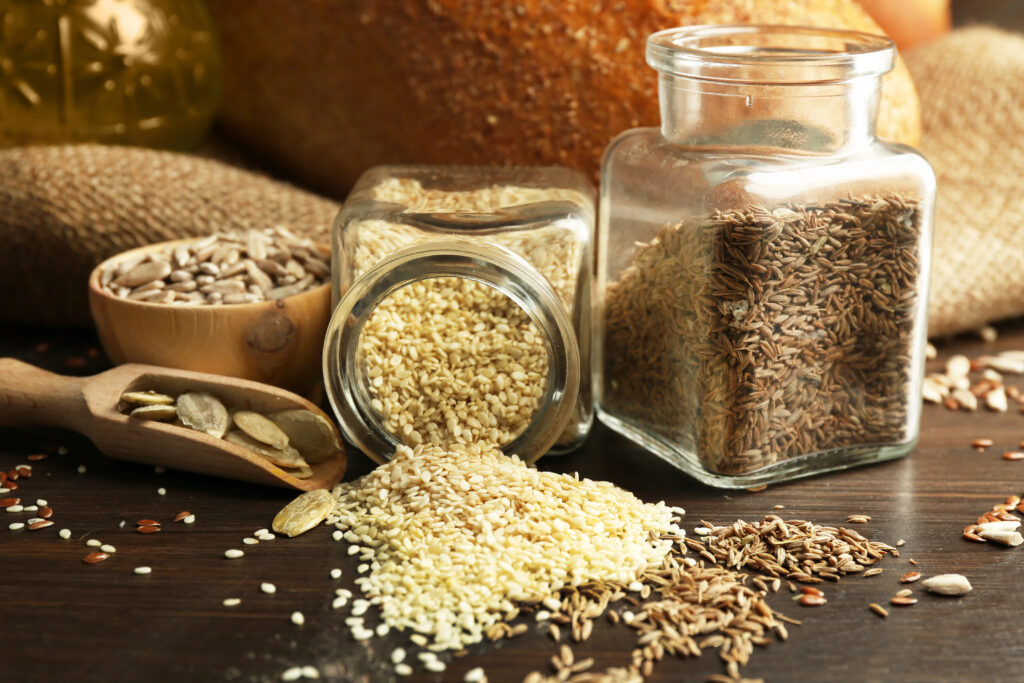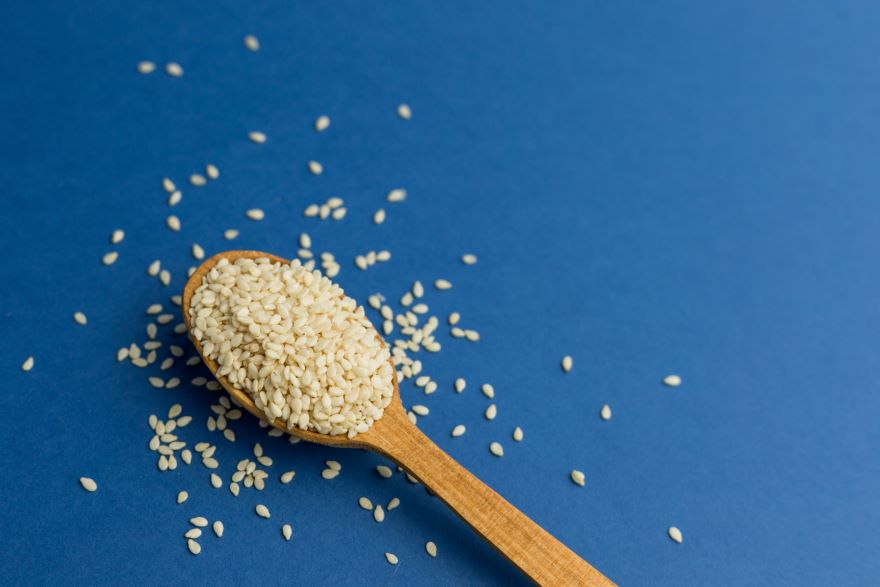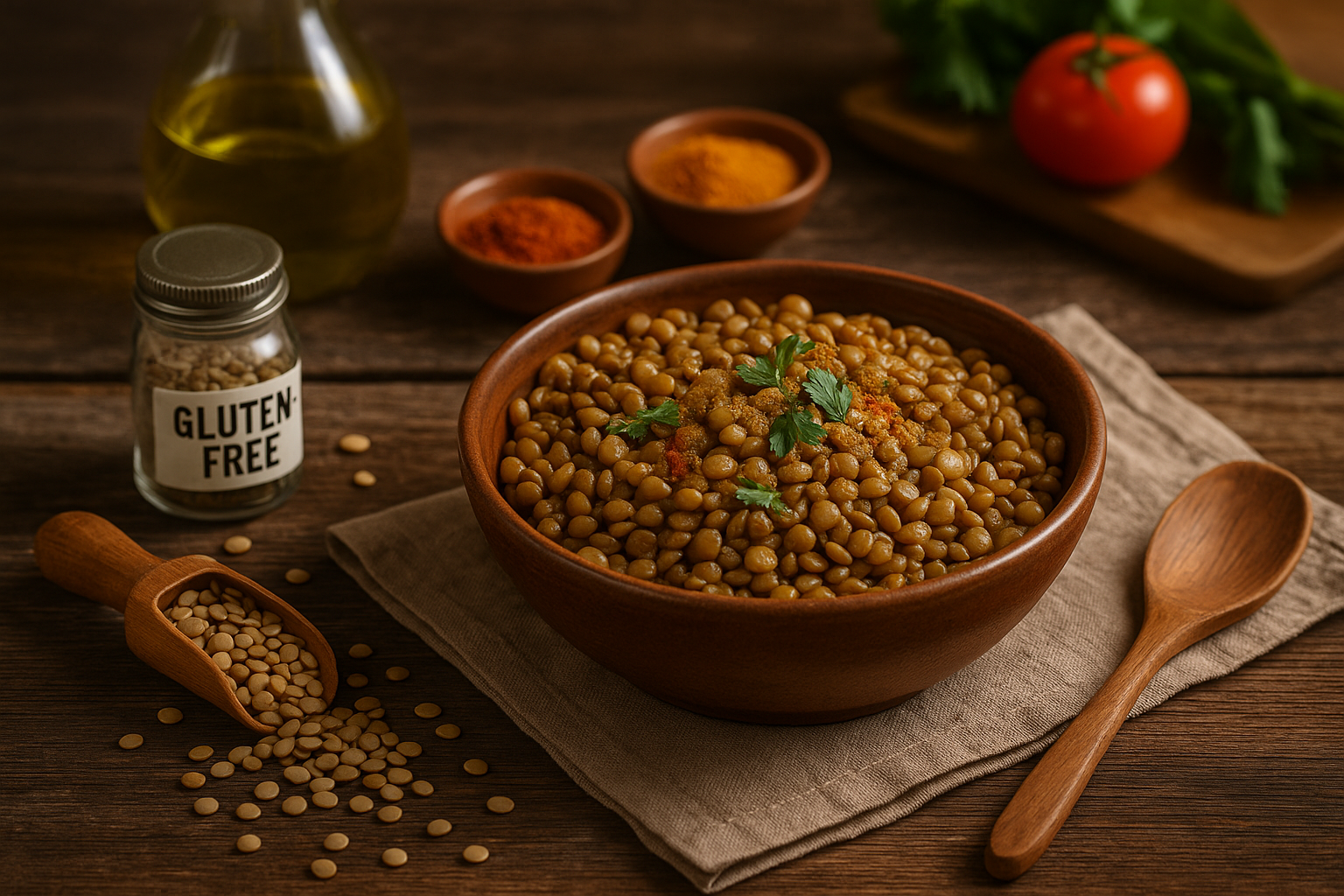The day I discovered the versatility of sesame seeds in gluten-free cooking, my culinary world expanded. I sat at my kitchen table, staring at a jar of these tiny seeds, wondering how they could possibly transform my diet. Little did I know, these gluten-free powerhouses would not only revolutionize my meals but also lead me on an unexpected journey to healthier eating. As I explored new ingredients and healthier options, I realized that this dietary change could be both nutritious and delicious.

The Sesame Seed Discovery
As I left my house, still processing my doctor’s warning about my rising cholesterol levels and the need for significant dietary changes, I found myself wandering past a small health food store. Something in the window caught my eye—a humble jar of sesame seeds. Little did I know, those tiny seeds would become the heroes of my story.
Growing up, I never gave sesame seeds much thought. They were just those pesky little things that got stuck in my teeth after eating a burger or sushi. But in that moment of uncertainty, a memory surfaced. I’d once read an article about the nutritional benefits of sesame seeds. If these little guys were so good for you, maybe they could help me navigate this new, scary world of healthy eating.
With nothing to lose (except maybe my beloved junk food), I marched into the store, bought that jar of sesame seeds, and headed home. I was determined to create something—anything—that might bring a spark of joy back to my newly health-conscious diet.
Nutty Smoothie: A Comforting Treat

My first attempt at a sesame seed smoothie was… interesting, to say the least. But after a few tries, I struck gold with what I now call my “Sesame Comfort” smoothie:
- 1 tablespoon of sesame seeds
- 1 ripe banana
- 1 cup of unsweetened almond milk
- 1 tablespoon of honey
- A pinch of cinnamon
- A handful of ice
For silky-smooth sesame seed smoothies, a high-powered blender is a game-changer. The Vitamix A3500 has been my secret weapon for creating perfectly blended, nutrient-packed drinks every time.
- Program Settings: Five program settings (for Smoothies, Hot Soups, Dips & Spreads, Frozen Desserts, and Self-Cleaning) ensure walk-away convenience and consistent results. The A3500 pairs with the Vitamix Perfect Blend App: Unlock the Ascent Series A3500's full potential with 17 programs and 500+ recipes with the iOS + Android app.
- Touchscreen Controls give the machine a sleek silhouette and are easily wiped clean.Electrical Ratings - 120 V, 50-60 Hz, 12 Amps. Cord: 4 feet. HP: 2.2-peak
- You're in Control: Variable Speed Control and Pulse feature let you manually fine-tune the texture of any recipe
- Built-In Wireless Connectivity: The motor base is able to read the container size you’ve chosen and automatically adjust program settings and maximum blending times accordingly. Add a range of compatible container sizes, building a customized blending system designed to fit your needs.
- Programmable Timer: A built-in timer helps avoid over- or under-processing your custom recipes. Set the timer to the length of your blend, and it will turn the machine off automatically. What's in the Box: motor base, low-profile 64 oz. container, low-profile classic tamper, Simply Blending Cookbook
I’ll never forget the first time I got it right. I took that smoothie out to my porch, watched the sunrise, and felt a glimmer of hope I hadn’t experienced since deciding to change my diet. It wasn’t just about the drink; it was proof that I could not only manage this new healthy eating plan but maybe even enjoy it. This moment showed me that making better food choices didn’t have to mean giving up on taste or satisfaction.
The smooth, nutty flavor of the sesame seeds blended perfectly with the sweetness of the banana and honey. The cinnamon added a warm, comforting note that made me feel like I was indulging in a treat rather than adhering to a restrictive diet. With each sip, I felt a little bit of my old self coming back.
Overcoming Challenges and Getting Creative
Of course, my journey wasn’t all smooth sailing. After a few weeks of my newfound sesame obsession, friends and family started giving me those looks. You know the ones—part pity, part exasperation—all “Oh, you poor thing, you can’t eat anything tasty anymore.”
Those comments stung, I won’t lie. There were days when the smell of greasy burgers from the fast food joint down the street nearly broke me. I’d walk by, inhaling deeply, remembering the taste of those juicy, cheese-laden patties. Sometimes, I’d even stand there for a minute, lost in food memories.
But every time I felt myself wavering, I’d remember how much better I’d been feeling. More energy, better digestion, and even clearer skin. Was I really going to give that up just because other people were uncomfortable with my dietary changes? Instead of caving to the pressure, I decided to get creative. If people thought healthy eating meant flavor-free, I was going to prove them wrong. And so began my adventure into the world of nutritious, sesame-based cooking.
The Savory Surprise: Sesame Meets Vegetables
My next smoothie experiment came from a desire to pack more veggies into my diet while still enjoying the benefits of sesame seeds. The result was a savory, nutrient-packed blend that became my secret weapon for powering through long work days:
- 1 tablespoon of sesame seeds
- 1 cucumber, peeled and chopped
- 1 handful of baby spinach
- 1/2 avocado
- 1 tablespoon of lemon juice
- 1/4 teaspoon of sea salt
- 1 cup of water
- Optional: 1 small clove of garlic (if you’re feeling adventurous!)
While I love my smoothies, sometimes I crave a refreshing juice. This Breville juicer lets me incorporate sesame seeds into fresh juice blends, expanding my gluten-free repertoire.
- The Breville Juice Fountain Cold XL features a bigger 3.5 inch feed chute and can extract 70 fl oz of nutrient rich juice up to five times faster than a 'cold press' machine; Juicer equipped with Cold Spin Technology and Noise Reduction Technology
- COLD EXTRACTION SYSTEM: A Breville juicer with Cold Spin Technology and an Italian-made precision mesh filter, allows you to avoid damage to vitamins and minerals from heat and processing
- SHORT PREP TIME: The Breville Juice Fountain Cold XL's unique 3.5 inch extra wide chute feed allows you to juice whole fruits and vegetables without pre-cutting
- SPACE SAVING DESIGN: With the pulp bin located behind the product base, the Juice Fountain Cold XL features a new and unique space saving design for a better use of your countertop space
- NOISE REDUCTION TECHNOLOGY: Imagine great performances that’s easier on the ear; Juicing on quiet setting reduces mechanical noise by 40%
The first sip of this concoction was a revelation. The creaminess of the sesame seeds and avocado balanced perfectly with the freshness of the cucumber and spinach. It was both satisfying and energizing—like a wake-up call for my taste buds and my body.
I started bringing this smoothie to work in a reusable bottle, and soon, curious coworkers were asking for sips. Their surprised exclamations—”This is gluten-free?” and “it’s actually good!”—were music to my ears. Slowly but surely, I was becoming the office health guru, a title I wore with pride.
One day, my boss caught me sipping my green smoothie during a particularly stressful meeting. She commented on how focused and calm I seemed, even under pressure. That’s when I realized that my new diet wasn’t just about avoiding gluten—it was about nourishing my body and mind in a way I never had before.
The Sweet Treat: Sesame Chocolate Indulgence
As my confidence grew, so did my willingness to experiment. One weekend, craving something sweet but not wanting to compromise my health, I created what would become my favorite dessert-like treat:
- 1 tablespoon of sesame seeds
- 1 frozen banana
- 1 tablespoon of raw cacao powder
- 1 cup of unsweetened almond milk
- 1 date, pitted (for extra sweetness)
- A pinch of sea salt
- Ice to taste
This smoothie was a game-changer. The richness of the cacao complemented the nuttiness of the sesame seeds perfectly, while the banana added natural sweetness and creaminess. It was like sipping a decadent milkshake, but with health benefits!
I started making this smoothie for weekend brunches with friends. Watching their skeptical expressions turn to delight as they tasted it was incredibly satisfying. Even my most die-hard gluten-loving buddies had to admit it was “pretty darn good.”
One friend, a self-proclaimed dessert aficionado, asked for the recipe. She couldn’t believe something so delicious could be gluten-free and actually good for you. That was the moment I realized I wasn’t just adapting to my new diet—I was thriving on it.
Growing My Own: The Sesame Garden Adventure
As my smoothie obsession grew, so did my curiosity about the ingredients I was using. I dove into researching the history of sesame seeds, fascinated by their journey from ancient times to modern superfood. Did you know they’ve been cultivated for over 3,000 years? This little bit of information sparked an idea: what if I grew my own sesame plants?
Now I should mention that my previous attempts at gardening had all ended in withered plants and disappointed sighs. But something about this felt different. Maybe it was the confidence I’d gained from my smoothie successes, or maybe it was just the sesame magic working its charm, but I decided to give it a go.
I started small, with a few sesame plants in containers on my balcony. The day I saw the first tiny sesame pod forming, I felt like a proud parent. Watching those plants grow and tending to them daily connected me to my food in a way I’d never experienced before.
There were challenges, of course. Like the time a sudden rainstorm nearly drowned my seedlings, or when a flock of birds discovered my plants and decided they’d make a nice snack. But each obstacle taught me something new about patience, perseverance, and the rhythms of nature.
And the taste! The first smoothie I made with my homegrown sesame seeds was mind-blowing. It was fresher, nuttier, and somehow more vibrant than anything I’d made before. Here’s the simple recipe I used to celebrate my gardening victory:
- 1 tablespoon of freshly harvested sesame seeds
- 1 apple, cored and chopped
- A handful of fresh mint leaves
- 1 cup of coconut water
- A squeeze of lime
- Ice to taste
Sipping this smoothie, made with sesame seeds I’d grown myself, was a moment of pure joy. It represented not just a tasty drink but the culmination of a journey that had led me to a healthier, more mindful way of living—all while strictly adhering to my gluten-free needs.
Seeds of Change: Sesame’s Impact Beyond My Plate
As I sit here, reflecting on my sesame seed smoothie journey, I’m amazed at how much has changed. What started as a desperate attempt to find something I could eat safely has rippled out into all areas of my life:
- Energy Levels: Gone are the days of gluten-induced fatigue. My sesame smoothies, packed with essential nutrients, keep me energized throughout the day. I’ve even started joining my coworkers for lunchtime walks, something I never had the energy for before.
- Digestive Health: The fiber in sesame seeds has significantly improved my gut health, helping me maintain regularity without discomfort. No more bloating or stomach pains that I used to think were just a normal part of life.
- Skin Health: The healthy fats and antioxidants in sesame seeds have given my skin a glow that no expensive cream ever did. I’ve actually had strangers compliment my complexion!
- Mindful Eating: Preparing my smoothies has become a mindful ritual, making me more aware of what I put into my body throughout the day. This awareness has spread to all my meals, leading to better food choices overall.
- Creativity: Experimenting with gluten-free, sesame-based recipes has sparked creativity in other areas of my life, from cooking to problem-solving at work. I’ve even started a blog to share my recipes and experiences.
- Community: Sharing my journey has connected me with others navigating celiac disease and gluten sensitivity. I’ve even started a small support group in my local community! We meet monthly to share recipes, tips, and sometimes just to vent about the challenges of living gluten-free.
- Environmental Awareness: Growing my own sesame seeds opened my eyes to the importance of sustainable food practices. I’m now more conscious of my environmental impact in all areas of life, from reducing plastic use to supporting local farmers.

Beyond Smoothies: Other Gluten-Free Sesame Delights
But my journey with sesame seeds hasn’t just been about smoothies. I’ve discovered so many other ways to incorporate these nutritional powerhouses into my gluten-free diet. Here are a few of my favorites:
Sesame Seed Crusted Chicken
Combine crushed nuts with herb-seasoned breadcrumbs for a crunchy, flavorful coating on chicken breasts. This nutty and savory mixture has become my go-to dinner party dish, impressing even friends with the most discerning palates
Sesame Tahini Dressing
Blend tahini (sesame seed paste) with lemon juice, garlic, and a bit of water for a creamy salad dressing or veggie dip. I keep a jar in my fridge at all times for quick, nutritious meals.
Sesame Stir-Fry
Toast some nuts and sprinkle them over your favorite veggie stir-fry for added crunch and flavor. It’s a simple way to elevate a weeknight dinner.
Sesame Seed Energy Balls
Mix ground nuts with dried fruit and a bit of honey for a quick energy snack. These have saved me during long meetings and busy days.

Unexpected Connections
One of the most unexpected benefits of my sesame seed journey has been the connections I’ve made with others. Through sharing my story and recipes online, I’ve connected with people from all over the world who are navigating similar health challenges. We swap recipes, share tips for managing social situations, and offer each other support on tough days.
I’ve even started hosting monthly “gluten-free gatherings” at my home, where we all bring a dish to share. It’s amazing to see the creativity and variety of gluten-free foods people come up with. And yes, there’s always at least one sesame seed dish on the table! These gatherings have become more than just dinner parties. They’re a place where people can relax, knowing that everything is safe to eat. I’ve seen friendships form, business ideas spark, and even a couple who met at one of my gatherings and later got married!
- Premium Quality: USDA Organic certified, Non-GMO Project Verified, and kosher, ensuring an excellent product for health-conscious consumers.
- Suitable for many preferences: Enjoy our delicious seeds are non-GMO, gluten-free, and vegan. Perfect choice for a variety of dietary needs.
- No preservatives: Only one ingredient - raw, unhulled, black seeds. These are packed in a convenient zip log bag for easy storage and long freshness.
- Safe Processing: Our seeds go through a cleaning process using air pressure and steam to limit any germination. Intended for human consumption only.
- Quick snack: Ready to eat straight from the bag. They are also great for making your own black tahini, or as topping for snacks, salads, and sushi.
Your Turn: Exploring the World of Sesame Seeds
As I wrap up my story, I invite you to give sesame seeds a try. Start small—just pick up a jar on your next grocery run and experiment. This journey isn’t about perfection, but progress and curiosity.
Here are a few questions to ponder as you begin:
- What’s one small step you can take today towards a healthier, gluten-free lifestyle?
- How might incorporating more nutrient-dense foods like sesame seeds impact your daily life?
- What health goal could you revisit with a fresh perspective?
Remember, every big change starts with a small step. My journey began with a single jar of sesame seeds and a willingness to try something new. Yours could start today.

Final Thoughts
When you’re trying out these sesame seed ideas, remember to cut yourself some slack. It’s all about baby steps and little wins. Did you make a killer smoothie? Awesome! Share that success with your friends or on social media. Trust me, it feels good to celebrate the small stuff.
On those days when you’re tempted to dive face-first into a pizza, don’t beat yourself up. We all have those moments. Just remember, there are tons of people out there on similar health kicks. Reach out, swap stories, share recipes. You’d be surprised how supportive the healthy eating community can be.
So here’s to your new adventure in tasty, nutritious eating! May your kitchen be full of exciting ingredients, and your life packed with energy, good vibes, and yeah, the occasional treat (because balance is key, right?). Keep rocking those sesame seeds, and who knows where they might take you! 🌱🥛

*We may earn a commission for purchases made using our links. Please see our disclosure to learn more.






